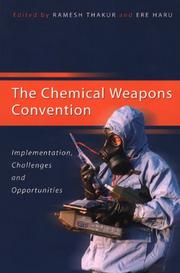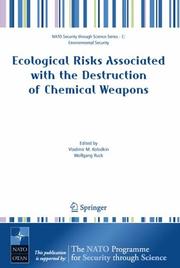| Listing 1 - 3 of 3 |
Sort by
|

ISBN: 9280811231 9789280811230 9781429441667 1429441666 9280870742 9789280870749 1280915730 9781280915734 9786610915736 6610915733 Year: 2006 Publisher: Tokyo ; New York : United Nations University Press,
Abstract | Keywords | Export | Availability | Bookmark
 Loading...
Loading...Choose an application
- Reference Manager
- EndNote
- RefWorks (Direct export to RefWorks)
The most complex and comprehensive disarmament treaty ever to be adopted, the Chemical Weapons Convention (CWC) is intended to provide robust assurance that chemical weapons will not be developed, produced, stockpiled, used or transferred. To implement and enforce the CWC and verify the ongoing elimination of declared chemical weapons production capacity and stockpiles, the Organisation for the Prohibition of Chemical Weapons (OPCW) inspects military and industrial sites in dozens of countries. OPCW membership now embraces over 95 per cent of the world's population and 98 per cent of the relev
Chemical arms control --- Armes chimiques --- Verification --- Contrôle --- Vérification --- Chemical weapons control --- Arms control
Book
ISBN: 9138225824 Year: 2006 Publisher: Stockholm Weapons of Mass Destruction Commission
Abstract | Keywords | Export | Availability | Bookmark
 Loading...
Loading...Choose an application
- Reference Manager
- EndNote
- RefWorks (Direct export to RefWorks)
Weapons of mass destruction. --- Nuclear arms control. --- Chemical arms control. --- Biological arms control. --- Armes de destruction massive --- Armes nucléaires --- Armes chimiques --- Armes biologiques --- Contrôle --- 872 Massavernietigingswapens --- 874.1 Regelgeving en controle --- 241 Hedendaagse wereldproblemen --- 255.1 Verenigde Naties --- Armes nucléaires --- Contrôle --- Biological arms control --- Chemical arms control --- Nuclear arms control --- Weapons of mass destruction --- CBRNEs (Weapons) --- CBRNs (Weapons) --- Chemical, biological, radiological and nuclear weapons --- Mass destruction, Weapons of --- NBC agents (Weapons) --- NBC weapons --- Nuclear, biological and chemical weapons --- WMDs (Weapons) --- Nuclear weapons control --- Chemical weapons control --- Biological weapons control --- Military weapons --- Arms control --- Nuclear weapons

ISBN: 1402031351 140203136X 9786610611324 1402031378 1280611324 Year: 2006 Publisher: Dordrecht, Netherland : Springer,
Abstract | Keywords | Export | Availability | Bookmark
 Loading...
Loading...Choose an application
- Reference Manager
- EndNote
- RefWorks (Direct export to RefWorks)
1 2 Prof. Dr. Vladimir Mikhailovitsh Kolodkin , Prof. Dr.-Ing. Wolfgang Ruck 1 Institute of Natural and Technogenic Disasters, Udmurt State University, Izhevsk (Russia), 2 Institute of Ecology and Environmental Chemistry, University Lüneburg (Germany) During the Cold War a whole arsenal of deadly chemical weapons was allowed to build up on both sides of the ideological divide. Happily, today the problems are reversed. Expertise is now required in the field of safe and environment-friendly disposal of chemical weapons and cleaning up of contaminated sites all around the world, but not least in the ex-Soviet-led countries. The participants and speakers to the NATO-Russia advanced research workshop on the “Ecological Risks Associated with the Destruction of nd th Chemical Weapons”, hosted by the University of Lüneburg on 22 - 26 October, 2003, therefore, came from many different parts of the world. Of the eight countries represented at the workshop, two were ex-Eastern- Block, and six were Western countries. Yet the West was by no means overrepresented. On the contrary, the Russian expert-speaker contingent, with 33 participants, did justice to the size of their country – and to their chemical-weapons problem – and provided the majority of active participants. In all, there were 57 participants, of which 11 dispatched from the TACIS project “The development of the chemical weapons” facility at the detached plant No 4 of OAO Khimprom, Novocheboksarsk.
Chemical weapons disposal --- Chemical arms control --- Armes chimiques --- Environmental aspects --- Congresses --- Congresses. --- Elimination --- Aspect de l'environnement --- Congrès --- Contrôle --- Chemical arms control -- Environmental aspects -- Congresses. --- Chemical arms control . --- Chemical weapons disposal -- Environmental aspects -- Congresses. --- Earth & Environmental Sciences --- Chemistry --- Physical Sciences & Mathematics --- Ecology --- Chemistry - General --- Congrès --- Contrôle --- EPUB-LIV-FT SPRINGER-B --- Chemical weapons control --- Chemical weapons --- CW disposal --- Disposal of chemical weapons --- Disposal --- Life sciences. --- Chemistry. --- Environmental sciences. --- Ecology. --- Quality control. --- Reliability. --- Industrial safety. --- Ecotoxicology. --- Waste management. --- Life Sciences. --- Environmental Science and Engineering. --- Chemistry/Food Science, general. --- Quality Control, Reliability, Safety and Risk. --- Waste Management/Waste Technology. --- Arms control --- Explosive ordnance disposal --- Hazardous wastes --- Environmental toxicology. --- System safety. --- Waste disposal. --- Safety, System --- Safety of systems --- Systems safety --- Accidents --- Industrial safety --- Systems engineering --- Ecotoxicology --- Pollutants --- Pollution --- Environmental health --- Toxicology --- Physical sciences --- Balance of nature --- Biology --- Bionomics --- Ecological processes --- Ecological science --- Ecological sciences --- Environment --- Environmental biology --- Oecology --- Environmental sciences --- Population biology --- Prevention --- Ecology . --- Industrial accidents --- Industries --- Job safety --- Occupational hazards, Prevention of --- Occupational health and safety --- Occupational safety and health --- Prevention of industrial accidents --- Prevention of occupational hazards --- Safety, Industrial --- Safety engineering --- Safety measures --- Safety of workers --- System safety --- Dependability --- Trustworthiness --- Conduct of life --- Factory management --- Industrial engineering --- Reliability (Engineering) --- Sampling (Statistics) --- Standardization --- Quality assurance --- Quality of products --- Environmental science --- Science
| Listing 1 - 3 of 3 |
Sort by
|

 Search
Search Feedback
Feedback About UniCat
About UniCat  Help
Help News
News